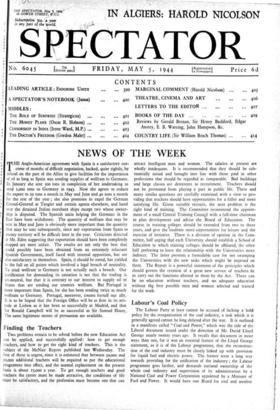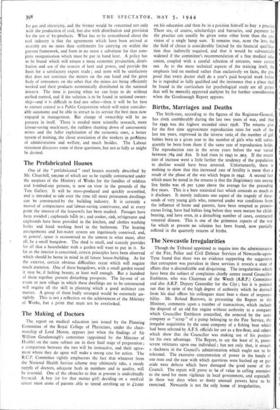Labour's Coal Policy
The Labour Party at least cannot be accused of lacking a bold policy for the reorganisation of the coal industry, a task which it is generally agreed cannot be long delayed after the war. It is outlined in a manifesto called "Coal and Power," which was the title of the Liberal document issued under the direction of Mr. David Lloyd George nearly twenty years ago. It recalls that document in more ways than one, for it was an essential feature of the Lloyd George statement, as it is of the Labour programme, that the reconstruc- tion of the coal industry must be closely linked up with provision for liquid fuel and electric power. The former went a long way towards providing for the unification of the industry ; the Labour programme goes farther, and demands national ownership of the whole coal industry and supervision of its administration by a National Coal and Power Corporation appointed by a Minister of Fuel and Power. It would have one Board for coal and another
for gas and electricity, and the former would be concerned not only with the production of coal, but also with distribution and provision for the use of by-products. What has to be remembered about the coal industry is that the agreements which have been arrived at recently are no more than settlements for carrying on within the present framework, and form in no sense a substitute for that com- plete reorganisation which must be put in hand later. A policy has to be found which will ensure a more economic production, distri- bution and use of the sources of heat and power, and provide the basis for a satisfactory export trade ; and none will be satisfactory that does not convince the miners on the one hand and the great body of consumers on the other that the mines are being efficiently worked and their products economically distributed in the national interest. The time is passing when we can hope to do without unified control, and if the solution is to be found in national owner- ship—and it is difficult to find any other—then it will be far best to entrust control to a Public Corporation which will enjoy consider- . able autonomy and be able to attract to its service the best men now engaged in management. But change of ownership will be no panacea in itself. There is needed more scientific research, more labour-saving machinery, the ruthless shutting down of uneconomic
mines and the fuller exploitation of the economic ones, a better system of training, the closer association of the workers in problems of administration and welfare, and much besides. The Labour statement discusses some of these questions, but not as fully as might be desired.























 Previous page
Previous page